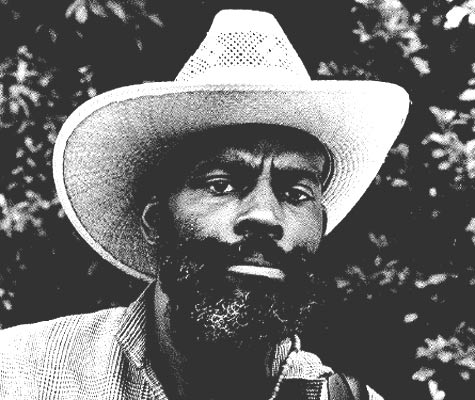
Melvin King at an anti-nuclear rally in Plymouth, Ma.
Photo by Christopher Brown
|
This article originally appeared in the June 26, 1979 issue of the Boston PhoenixTO: Department of Urban Studies and Planning, Massachusetts Institute of TechnologyFROM: Melvin H. King
SUBJECT: A Professional and Personal Agenda
DATE: March 4, 1976
To begin with, I'd like to set down the political and ideological frame of reference under which I try to live.
Simply stated, it is that Everything is Everything. We are all interrelated and interdependent; either everybody owns everything or nobody owns anything. . . . Underlying that framework is a belief that people collectively and individually have the capacity—better yet, the desire—to change their relationships to each other and their environments in a positive way . . . .
Melvin H. King is 50 years old, the father of six children, and his beard is streaked these days with gray and white. For nearly 20 years he's been a political activist in the city's black community (his first of three unsuccessful tries for the school committee came in 1961), and since 1973 he has served as state representative for a district that includes most of the South End, much of the Fenway, and portions of Roxbury and the Back Bay. But after 20 years in politics, 15 years in social work and a lifetime spent observing Boston's racial polarization firsthand, he remains the city's ultimate optimist. "He is the last of the true humanists," said long-time backer Martin Gopen. "If you can understand his incredible faith in people, sometimes to the point of frustration, then you can understand him."
And you can begin to understand why he's running for mayor when, by all realistic measures, he doesn't have a chance. No black has ever come close to winning the mayoralty, or even to becoming one of the two finalists in the November election, and King stands little chance on that score as well. In fact, unless he changes the haphazard style his campaign has displayed so far, there is little chance he will even mount a good showing in the September balloting.
King, true to form, disagrees with this analysis, saying that the people's desire for positive leadership "may be a lot larger in numbers than the press and other doomsayers realize." Maybe. But in one important sense, whether the election results bear out his optimism or not, Mel King's candidacy may be as vital to the coming campaign as that of Mayor Kevin White, or state Senator Joseph Timilty, or School Committee President David Finnegan. For King has some things to say that the other major contenders will not, for fear of losing votes: his continual attacks on the White administration for giving anti-buser James Kelly of South Boston a $17,500-a-year job demonstrate as much. (Said King to one crowd last week: "The mayor is saying, 'If you are a racist and you are violent, we will reward you.'")
Said Kay Gibbs, a South End resident and former legislative black caucus staffer who has long backed King: "One of the very first things he's out to accomplish, which he clearly will, is to raise the quality of the dialogue in the race. Mel's view is that there are a lot of issues the other candidates will not and don't want to talk about, and they affect the quality of life here the most. Mel is hell-bent to raise them."
In fact, many of the issues King has raised so far are identical to those addressed by his opponents—crime, unemployment, the city's "livability," the need for development in the neighborhoods instead of downtown. Some issues, like the death of rent control scheduled for the end of the year, have remained his exclusively, but even where the issues are the same, King's approach is often markedly sharper than his opponents'. He lays the blame for the recent violence in the city—the Roxbury murders, the Brighton rapes and the Blue Hill Avenue stonings—squarely on the doorstep of White's administration.
"This administration in 12 years has buried its head in the sand and has not taken one meaningful stand on issues of crime and violence in this city," he told some supporters last week. "When you have the level of violence in this city, it is because you have an administration that countenances it." So far as we know, he is the only candidate who has termed as "racial" the Blue Hill Avenue incidents, in which black youths have stoned cars driven by whites and then robbed the motorists, and he has criticized Boston Police Superintendent Earl Bolt, a black, for saying otherwise. "That's crazy,' he said of Bolt's characterization of the stonings. "We have to hone it down and face reality."